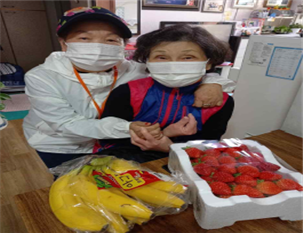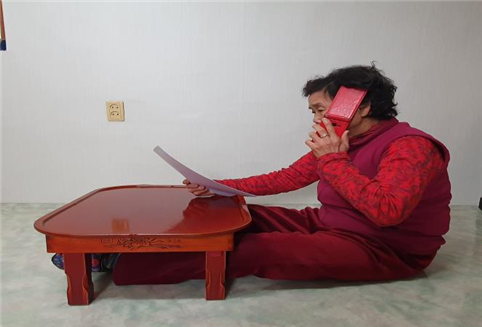Best Practice for Older Person Care by Older Persons:
three examples from Korea
The concept of ‘Older person care by older persons’ involves a healthy older person regularly visiting another older person who has difficulty with mobility in order to help them in their daily lives with cleaning, washing, cooking, washing dishes, and companionship (Korea Senior Human Resources Development Institute). According to the 2021 senior citizen statistics, the population aged 65 or older in 2021 is 16.5 per cent of the total population, and Korea is expected to enter a super-aged society, with 20.3 per cent in 2025. By 2060, people aged 65 and over will make up 43.9 per cent of the population. ‘Older person care by older persons’ is a response to this trend, and is in the spotlight partly because it represents a new job prospect for older persons.
According to the ‘Older person care by older persons Status Survey’ published by the National Human Rights Commission of Korea in November 2018, the number of ‘Older person care by older persons’ projects (‘Older person care by older persons’ is the government’s projects in which both service participants and recipients are older persons) slightly decreased, from 80,345 in 2015 to 73,302 in 2017, but the number of projects increased slightly, from 1,219 to 1,256. The cumulative number of participants increased from 91,203 to 92,309, and the number of beneficiaries increased from 130,499 to 140,055. As of 2020, there were about 79,000 ‘Older person care by older persons’ jobs, more than 10 per cent of the total jobs for older persons. Advanced foreign countries such as Japan, the United States, and Norway run a wide variety of ‘Older person care by older persons’ projects, and Korea is also carrying out diverse projects such as 'Older person care by older persons project through the disabled older person' in Seodaemun-gu, Seoul, '9988 Happiness Guardian' in Chungcheongbuk-do, and 'Senior Consumer Protector' by the Korea Labor Force Development Institute for the Aged.
1. ‘Older person care by older persons by the older person with disabilities’ in Seodaemun-gu, Seoul.
Seodaemun-gu (Seoul consists of 25 administrative districts, gu), Seoul, has selected 15 people with disabilities aged 50 or older as care providers in the project, which cares for 75 older persons living alone. The project aims to stabilize income for disabled persons, prevent the lonely deaths of older persons living alone, and enable disabled persons to participate in. Project participants as care providers receive employment insurance, industrial accident insurance, and private insurance (injury and liability for compensation). They work three hours a day, 19 days a month (57 hours), and receive 800,000 KRW (about 630 USD) per month. The project was selected as the 'Best Practice for Local & Public Sector Jobs' in the annual competition hosted by the Ministry of Public Administration and Security in 2017, and also won the Presidential Award.
Ms. Jeong (66, female) has been participating in this project as a service provider for four years. She was deeply moved when a 91-year-old older person she looks after, who was living alone and isolated after her husband's death, said, “You're better than my daughter.” “I visit the older lady regularly, we eat together, talk a lot, and I go to the hospital with her, and I think that is why she opened her heart. I've only been receiving from society because I'm disabled, but now I'm proud and really happy to think that I'm also contributing to the community.” Ms. Jeong said with a big smile.
The project of 'Older person care by older persons through the disabled older person' helps the socially disadvantaged, provides an employment opportunity for people with disabilities, who have difficulties in participating in the labor market, and prevents loneliness. The project is in line with the government's policy of realizing community care for a healthy society as well as overcoming loneliness and preventing lonely deaths among older persons living alone.

2. '9988 (staying active until 99 years old) Happiness Guardian' in Chungju-si
Chungcheongbuk-do (North Chungcheong Province, located in the middle of South Korea) launched the '9988 Happiness Guardian' as a pilot project in 2014. Chungju-si (one of the cities in Chungcheongbuk-do) has continued with this project since 2015. The '9988 Happiness Guardian' project is an older person care by older persons project that has selected 840 older persons as service providers who have lived in the village for many years and have good health, relevant experience, and a spirit of service. These persons visit economically vulnerable older persons in the same village. Each participant visits two to three service recipients and provides services such as emotional support, safety checks, etc. three hours a day, 30 hours a month. They are paid 270,000 KRW (about 210 USD) per month, together with incidental expenses of 180,000 KRW (about 140 USD) per month. The total budget for the project is about 2.8 billion KRW (about 221,500 USD). Currently, Chungju Senior Club, Chungju Branch of the Korean Senior Citizens' Association, and Chungju Senior Welfare Center are operating this project.
The '9988 Happiness Guardian' project has two purposes. First, it is intended to contribute to improving welfare for older persons while providing them with various jobs and opportunities for social activities, so that older persons can lead a lively and healthy life after retirement. Second, it aims to establish a social safety net for vulnerable older persons who need care due to a surge in senile diseases such as dementia and stroke.
Older persons in small cities are relatively less well supported by social policy than those in large cities. Compared to other regions, the metropolitan area has more services and benefits. Many studies argue that rural areas lack policy support compared to cities; the '9988 Happiness Guardian' project provides services suitable for the local community based on the regional specificity whereby there are more older persons in rural areas than in the cities. Further, this project solves the traffic inconvenience problem in rural area by providing care among residents in the same neighborhood. It also has the advantage of promoting easy bond formation between service providers and recipients (National Human Rights Commission, 2018). This project shows that there should be more projects that respond to the needs of older persons to create more community-tailored schemes for care of older person by older persons.

3. ‘Senior Consumer Guardian', a project of the Korea Consumer Agency
The ‘Senior Consumer Guardian’ project trains older counselors and deploys them to welfare centers and community centers to provide counseling for older persons on practical matters such as preventing them becoming victims of fraudulent advertisements. This project protects the rights and interests of the older generation, who have relatively less access to information services and are less familiar with the latest information technology than younger generations. When the modifiers 'eco-friendly' or 'functional' are attached to products, older persons tend to purchase them without doubt, which often leads to them economic loss. This demonstrates that the idea of 'older person care by older persons', previously limited to care, can be expanded to other areas.
This project started as a pilot program in Daejeon in 2019, as a new project, and trained a total of 34 senior consumer guardians. 213 people were recruited in 2020, 355 in 2021 and 500 in 2022. In 2021, 355 senior consumer guardians in 13 regions across the country corrected 1,229 cases of fraudulent advertising and harmful products for older persons. It was commended as excellent in the civic participation category in the '2021 Innovation, Collaboration, and Citizen Participation Assessment' organized by the Ministry of Economy and Finance. The project has brought about positive outcomes: providing jobs for retired older persons in public service activities, and helping to solve problems related to information gap that affects older persons negatively.
Jaesung Lee (being08@asemgac.org)